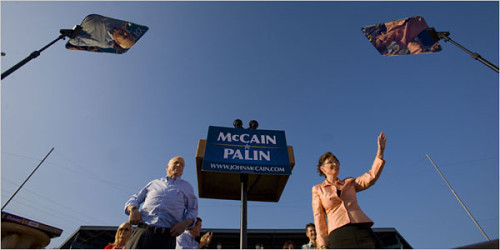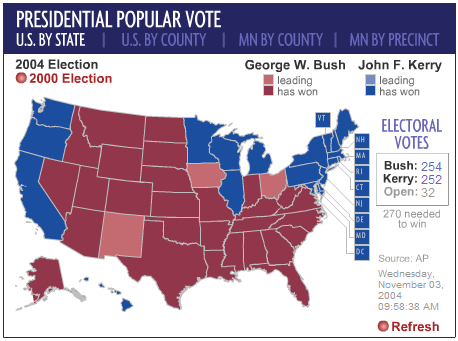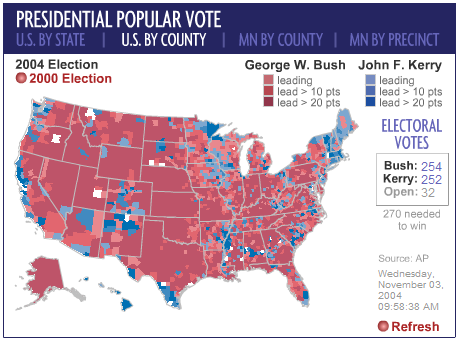I work with statistics and polling data every day. Something rubbed me the wrong way. I checked the exit polls for Florida--all wrong. CNN's results indicated a Kerry win: turnout matched voter registration, and independents had broken 59% to 41% for Kerry.
Polling is an imprecise science. Yet its very imprecision is itself quantifiable and follows regular patterns. Differences between actual results and those expected from polling data must be explainable by identifiable factors if the polling sample is robust enough. With almost 3.000 respondents in Florida alone, the CNN poll sample was pretty robust.
The first signs of the rat were identified by Kathy Dopp, who conducted a simple analysis of voter registrations by party in Florida and compared them to presidential vote results. Basically she multiplied the total votes cast in a county by the percentage of voters registered Republican: this gave an expected Republican vote. She then compared this to the actual result.
Her analysis is startling. Certain counties voted for Bush far in excess of what one would expect based on the share of Republican registrations in that county. They key phrase is "certain counties"--there is extraordinary variance between individual counties. Most counties fall more or less in line with what one would expect based on the share of Republican registrations, but some differ wildly.
How to explain this incredible variance? Dopp found one over-riding factor: whether the county used electronic touch-screen voting, or paper ballots which were optically scanned into a computer. All of those with touch-screen voting had results relatively in line with her expected results, while all of those with extreme variance were in counties with optical scanning.
The intimation, clearly, is fraud. Ballots are scanned; results are fed into precinct computers; these are sent to a county-wide database, whose results are fed into the statewide electoral totals. At any point after physical ballots become databases, the system is vulnerable to external hackers.
It seemed too easy, and Dopp's method seemed simplistic. I re-ran the results using CNN's exit polling data. In each county, I took the number of registrations and assigned correctional factors based on the CNN poll to predict turnout among Republicans, Democrats, and independents. I then used the vote shares from the polls to predict a likely number of Republican votes per county. I compared this ‘expected' Republican vote to the actual Republican vote.
The results are shocking. Overall, Bush received 2% fewer votes in counties with electronic touch-screen voting than expected. In counties with optical scanning, he received 16% more. This 16% would not be strange if it were spread across counties more or less evenly. It is not. In 11 different counties, the ‘actual' Bush vote was at least twice higher than the expected vote. 13 counties had Bush vote tallies 50--100% higher than expected. In one county where 88% of voters are registered Democrats, Bush got nearly two thirds of the vote--three times more than predicted by my model.
Again, polling can be wrong. It is difficult to believe it can be that wrong. Fortunately, however, we can test how wrong it would have to be to give the ‘actual' result.
I tested two alternative scenarios to see how wrong CNN would have to have been to explain the election result. In the first, I assumed they had been wildly off the mark in the turnout figures--i.e. far more Republicans and independents had come out than Democrats. In the second I assumed the voting shares were completely wrong, and that the Republicans had been able to massively poach voters from the Democrat base.
In the first scenario, I assumed 90% of Republicans and independents voted, and the remaining ballots were cast by Democrats. This explains the result in counties with optical scanning to within 5%. However, in this scenario Democratic turnout would have been only 51% in the optical scanning counties--barely exceeding half of Republican turnout. It also does not solve the enormous problems in individual counties. 7 counties in this scenario still have actual vote tallies for Bush that are at least 100% higher than predicted by the model--an extremely unlikely result.
In the second scenario I assumed that Bush had actually got 100% of the vote from Republicans and 50% from independents (versus CNN polling results which were 93% and 41% respectively). If this gave enough votes for Bush to explain the county's results, I left the amount of Democratic registered voters ballots cast for Bush as they were predicted by CNN (14% voted for Bush). If this did not explain the result, I calculated how many Democrats would have to vote for Bush.
In 41 of 52 counties, this did not explain the result and Bush must have gotten more than CNN's predicted 14% of Democratic ballots--not an unreasonable assumption by itself. However, in 21 counties more than 50% of Democratic votes would have to have defected to Bush to account for the county result--in four counties, at least 70% would have been required. These results are absurdly unlikely.
The second rat
A previously undiscovered species of rat, Republicanus cuyahogus, has been found in Ohio. Before the election, I wrote snide letters to a state legislator for Cuyahoga county who, according to media reports, was preparing an army of enforcers to keep ‘suspect' (read: minority) voters away from the polls. One of his assistants wrote me back very pleasant mails to the effect that they had no intention of trying to suppress voter turnout, and in fact only wanted to encourage people to vote.
They did their job too well. According to the official statistics for Cuyahoga county, a number of precincts had voter turnout well above the national average: in fact, turnout was well over 100% of registered voters, and in several cases well above the total number of people who have lived in the precinct in the last century or so.
In 30 precincts, more ballots were cast than voters were registered in the county. According to county regulations, voters must cast their ballot in the precinct in which they are registered. Yet in these thirty precincts, nearly 100.000 more people voted than are registered to vote -- this out of a total of 251.946 registrations. These are not marginal differences--this is a 39% over-vote. In some precincts the over-vote was well over 100%. One precinct with 558 registered voters cast nearly 9,000 ballots. As one astute observer noted, it's the ballot-box equivalent of Jesus' miracle of the fishes. Bush being such a man of God, perhaps we should not be surprised.
What to do?
This is not an idle statistical exercise. Either the raw data from two critical battleground states is completely erroneous, or something has gone horribly awry in our electoral system--again. Like many Americans, I was dissatisfied with and suspicious of the way the Florida recount was resolved in 2000. But at the same time, I was convinced of one thing: we must let the system work, and accept its result, no matter how unjust it might appear.
With this acceptance, we placed our implicit faith in the Bush Administration that it would not abuse its position: that it would recognize its fragile mandate for what it was, respect the will of the majority of people who voted against them, and move to build consensus wherever possible and effect change cautiously when needed. Above all, we believed that both Democrats and Republicans would recognize the over-riding importance of revitalizing the integrity of the electoral system and healing the bruised faith of both constituencies.
This faith has been shattered. Bush has not led the nation to unity, but ruled through fear and division. Dishonesty and deceit in areas critical to the public interest have been the hallmark of his Administration. I state this not to throw gratuitous insults, but to place the Florida and Ohio electoral results in their proper context. For the GOP to claim now that we must take anything on faith, let alone astonishingly suspicious results in a hard-fought and extraordinarily bitter election, is pure fantasy. It does not even merit discussion.
The facts as I see them now defy all logical explanations save one--massive and systematic vote fraud. We cannot accept the result of the 2004 presidential election as legitimate until these discrepancies are rigorously and completely explained. From the Valerie Plame case to the horrors of Abu Ghraib, George Bush has been reluctant to seek answers and assign accountability when it does not suit his purposes. But this is one time when no American should accept not getting a straight answer. Until then, George Bush is still, and will remain, the ‘Accidental President' of 2000. One of his many enduring and shameful legacies will be that of seizing power through two illegitimate elections conducted on his brother's watch, and engineering a fundamental corruption at the very heart of the greatest democracy the world has known. We must not permit this to happen again.



